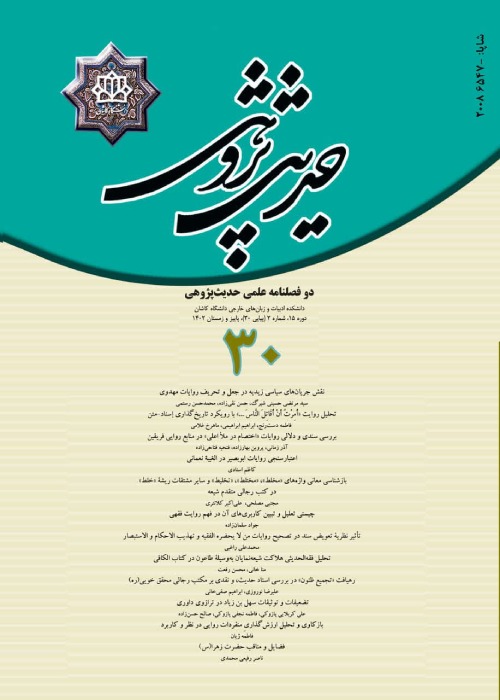Detecting the damage of understanding hadith from Sheikh Anṣārī's point of view
Understanding the ḥadīth is the next step after proving the issuance of the ḥadīth and making sure that the text is correct. Scholars, jurists and ḥadīth researchers have different principles and methods in understanding ḥadīth which have a great impact on the understanding of ḥadīth and its main and real purpose. In fact, understanding ḥadīth and understanding the real meaning of the pure narrators, which is the ultimate goal of all aḥādīth knowledges, is one of the most important and difficult knowledge of ḥadīth. The Infallible Imams (pbuh) have given a lot of advice on the science of critical study of transmission of tradition and understanding of ḥadīth. Al-Sheikh al-Ṣadūq, in his book Maʿānī l-ʾAkhbār has quoted from Dāwūd ibn Farqad from Imām al-Ṣādiq (pbuh) that the narrator said: I heard from Imam Ṣādiq (pbuh) that he said: "You are the best jurists, when you understand the meaning of our words." Sheikh Aʿzam writes: “The meaning of this tradition is to encourage Ijtihād and to use all one's strength in the way of understanding the meanings of the traditions.”
Jurists in their deductive jurisprudential books have criticized and evaluated many ḥadīths with bases and methods and have discovered the meaning and purpose of the transmitter of the hadith. Sheikh al-Anṣārī, the deep-thinking Shiʿa jurist, has also criticized and understood many ḥadīths in his jurisprudential and principal collections. The author tries to analyze his foundations and methods in understanding the ḥadīth with descriptive-analytical method by providing objective examples among his works, which no work has been observed in this regard. The Isnad or the text of the tradition may refer to damages such as Idrāj, Taṣḥīf, Taḥrīf, Taqdīm wa Ta’khīr, Iḍṭrāb, taqṭī’, transmitted to meaning, etc., which make it difficult to validate or understand it. The ḥadīth researcher should review the context of ḥadīth before beginning to understand ḥadīth and identify these damages and take necessary steps to eliminate them and access to an emended text of the ḥadīth to pave the way for the understanding of the ḥadīth.
Sheikh al-Anṣārī, in his jurisprudential and principal works, has noticed the damages that affect the correct understanding of ḥadīth in order to study the emergence and achieve the serious purpose of the Imam (pbuh), some of which are:The ḥadīth in the view of Sheikh al- Anṣārī should be examined before the process of understanding ḥadīth begins, so that it is not Taṣḥīf in it and it should be reconstructed, if it has Taṣḥīf. Sheikh al-Anṣārī applies the principle of non-misrepresentation if there is doubt about the occurrence of the Taṣḥīf in the narration. Sheikh al-Anṣārī considers the wrong understanding of some ḥadīths as a result of the negligence of the Idrāj occurred in the traditions, and although he did not use the term Idrāj and did not say that the narration is entered, but he noticed it and considered neglecting it as a reason for the slippage of others.Taqdīm wa Ta’khīr is one of the disadvantages of understanding the ḥadīth that has appeared in some ḥadīths and Sheikh al-Anṣārī paid attention to this damage and sometimes made it easier to understand the ḥadīth by showing it.It is necessary for a ḥadīth researcher from Sheikh al-Anṣārī's point of view to reconstruct an interrupted ḥadīth by referring to the original sources in order to have a correct understanding of the ḥadīth. He considers the exact semantics of some narrations to be dependent on seeing the entire narration, and brings the entire narration and explores the Infallible's meaning. Sheikh al-Anṣārī considered it permissible for a word in a ḥadīth to be transmitted in the meaning. He clarifies in the case that the original and the transmitted word's meaning differ only in the wording: "It is not permissible to transmit an muṭlaq tradition in a muqayyad manner, even if the transmitter acknowledges that it meant by muṭlaq is muqayyad manner, because this Ijtihād is from the transmitter and is only a proof for himself." Sheikh al-Anṣārī sometimes differentiates the tradition that transmitted to word from the tradition that transmitted to meaning by comparing similar narrations related to the same subject and by considering other evidences.One of the other problems of some ḥadīths that should be noticed before entering into the understanding of ḥadīth is having or showing Iḍṭrāb in ḥadīth. The extent of this problem is such that Muḥaqqiq al-Baḥrānī has claimed that there are few ḥadīths in al-Sheikh al-Ṭūsī’s Tahdhīb that are free of Ikhtilāl and Iḍṭrāb in the Isnad or text. Sheikh al-Anṣārī paid attention to this issue and tried to solve it. Sheikh al-Anṣārī points out: One of the problems that may cause misunderstanding in a ḥadīth is not to refer to similar and related ḥadīths, and therefore, in some cases, by referring to similar ḥadīths, Sheikh al-Anṣārī tried to remove the ambiguity of the ḥadīths.
The present research has dealt with some of these damages in Sheikh al-Anṣārī's viewpoint in a descriptive-analytical manner and has concluded that: factors such as not referring to primary references, Idrāj, Taṣḥīf, Taḥrīf, Taqdīm wa Ta’khīr, Iḍṭrāb, taqṭī’, transmitted to meaning and failure to refer to similar hadiths to remove ambiguity from the hadith has been considered by Sheikh al-Anṣārī, and even Sheikh al-Anṣārī himself has suffered from some of these damages and they have caused him to make mistakes in understanding the hadith in some cases.
- حق عضویت دریافتی صرف حمایت از نشریات عضو و نگهداری، تکمیل و توسعه مگیران میشود.
- پرداخت حق اشتراک و دانلود مقالات اجازه بازنشر آن در سایر رسانههای چاپی و دیجیتال را به کاربر نمیدهد.


